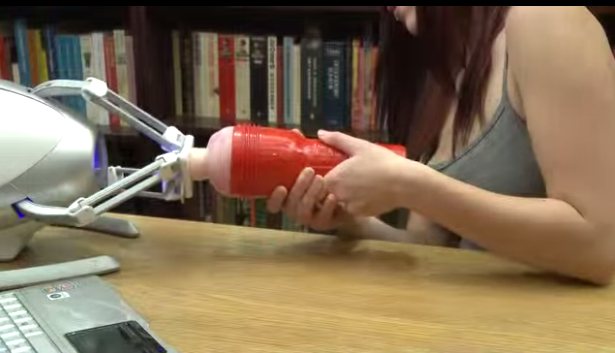
Patent trolls are so prolific these days that you don't really need to be successful to draw lawsuits. Case in point, a recently formed California company called TZU Technologies is demanding cash from six different players in the "virtual sex" industry—which barely even exists.
TZU is using US Patent No. 6,368,268 to sue six companies working in the touch-over-Internet arena: Comingle, Holland Haptics, Vibease, Internet Service, Frixion, and Winzz.
The patent was invented by Warren Sandvick, president of a Texas company called HasSex, which has an extremely trollish website and licensed the patent several times. Filed in 1998, and granted in 2002, the patent lays broad claim to a remotely controlled sexual "stimulation system," one version of which involved a "second user interface" located remotely from the first.
This year, Sandvick apparently sold the patent to TZU, which has bigger plans for the patent. Earlier this week, TZU filed six lawsuits. The defendants include:
Comingle, a company that is taking pre-orders for its product, a programmable dildo called the Mod.
Happy Haptics Inc., which does business as Frixion, a software system for virtual sex. Frixion has been getting a ton of press since 2013 but hasn't moved out of private beta.
Internet Services LLC, which creates RealTouch, a male masturbation device, and also offers the "RealTouch interactive" service. Read the complaint (PDF). RealTouch's website says the company is shutting down in September, and it hasn't sold devices since January 2014.
Holland Haptics, which creates the Frebble, a Kickstarter-backed project that suggests nothing more salacious than virtual hand-holding. Frebble's Kickstarter page suggests it has just recently been delivered to Hong Kong-based backers. Here's the Holland Haptics complaint (PDF), which also names Kickstarter as a defendant.
Winzz, which creates the LovePalz vibrator, another product available for "pre-order." The author of the sex-toy blog Metafetish, which first noted the TZU lawsuits, pointed out that LovePalz said it started shipping products in 2013, but no one has seen the device actually working. Update: Metafetish author Kyle Machulis tells me via email that Winzz did ship the LovePalz toys. "They suck, but they do exist," he says.
Vibease, which makes a Bluetooth-controlled vibrator. It appears to be the only one of the six companies sued by TZU that's actually selling a product.
More than anything, the TZU phenomenon seems to be one more data point suggesting that as it becomes harder to win high-stakes patent suits, the best business model for trolls may be to seek small payouts from companies that are ill-equipped to afford a legal defense. Basic Google-level research suggests that five of these six defendants can't possibly have significant sales at this point.
It's also possible that the patent's first owner, HasSex, licensed all the targets with any value at all, leaving just a group of maybe, coming-soon, and has-been defendants.
TZU is represented by lawyers at the Pasadena-based Cotman IP Law Group, which didn't respond to a request for comment on this story.
reader comments
94